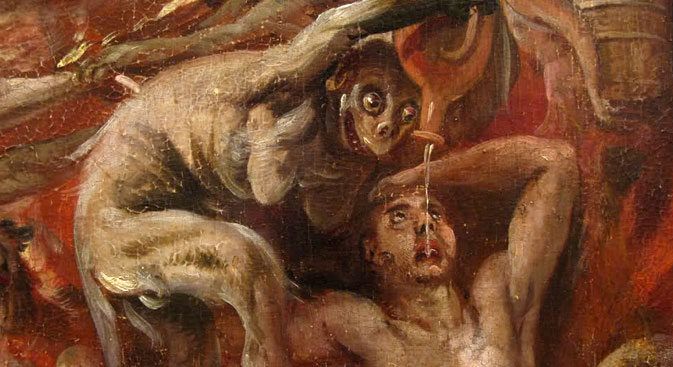A Devilish Trick — I think therefore I am?
Few things seem so obvious and undeniable as the self. Whatever uncertainties you might harbor about how to live — how to be happy, how to behave morally, what relationships to pursue, or what work to do, you probably retain the bedrock assumption that all these things are happening to an easily identifiable, single entity called you. This feels like such firm ground, in fact, that it forms the basis of what is arguably the most famous line in the history of Western philosophy: the seventeenth-century French philosopher Rene Descartes's dictum Cogito ergo sum: I think, therefore I am. There are very few aspects of our experience of being alive, Descartes realised, about which we can truly be certain. But we can be confident that we are us — that, in the most basic sense, we are who we take ourselves to be. lt is worth following Descartes's argument quite closely here…
Imagine, he begins, an evil demon who is determined to play as many tricks on you as possible — a demon supremely powerful and cunning, who has devoted all his efforts to deceiving you. How far could the demon's deceptions go? Don't forget, Descartes points out, that you rely for your entire understanding of the external world on your five senses: you can't know anything at all about what's going on outside your body unless you can touch, see, hear, smell, or taste it. And so, in principle, everything you think you know about that world might in fact be a breathtakingly detailed and convincing illusion, concocted by the evil demon. Looking out from inside your head, Descartes asks, how could you ever be completely certain that the sky, the air, the earth, colors, shapes, sounds and all external things are not merely delusions — traps that the demon has laid?
You might respond that such a scenario is absurdly unlikely, but Descartes is not concerned with its likelihood. He is employing the philosophical technique that came to be known as 'systematic doubt', attempting to isolate only that knowledge that he could regard as totally, unshakably certain. Descartes' evil demon might go further still, (he is extremely evil, after all). By sending the right sort of deceptive signals to your brain, he might even be responsible for your feeling that you possess a physical body. Maybe, in reality, you don't have a body. Maybe you're just a brain in a jar on a shelf in the demon's laboratory. How could you ever be sure? The parallels here with the 1999 movie The Matrix are not coincidental: that film is essentially a twentieth-century meditation on Descartes' seventeenth-century insights. "A viewer of The Matrix", is naturally led to wonder: how do I know I am not in the matrix? How do I know for sure the world is not a sophisticated charade, put forward by some superhuman intelligence in such a way that I cannot possibly detect the ruse?
And yet despite these possibilities for deception, there is exactly one thing and one thing only that cannot possibly be an illusion, Descartes maintains — the fact that you are experiencing all this. Even the person who fears that he or she may be being fooled about literally everything else must know for sure that there is a 'him' or a 'her' who's being fooled. The demon couldn't fake that. The proposition "I think, therefore I am", writes Descartes, "is the first and most certain which presents itself to whoever conducts their thoughts in order." You might not be able to know much with utter certainty. But you know that you are you. The sense of being you can't be an illusion — because "you" is what's experiencing all these possibly illusory things in the first place. Somebody has to be there in order to be tricked… Or do they?
The Scottish philosopher David Hume, suggested: simply try turning your attention inwards, and try to find this thing you call your self. Hume had made the attempt many times, he claimed, but he could never succeed. Instead of a self, all he ever found were specific processes: emotions, sensations, and thoughts. "Where was the self that was feeling those emotions, sensing those sensations, and thinking those thoughts? He concluded: We are nothing but a bundle or collection of different perceptions, which succeed each other with an inconceivable rapidity, and are in perpetual flux and movement.
Modern neuroscience has provided strong support for the suspicion that the self is not the 'thing' that we imagine it to be — that there is, in the words of the neuropsychologist Paul Broks, no center in the brain where things do all come together: One good illustration of this emerges from experiments involving patients with 'split brains' — people in whom the corpus callosum, which connects the left and right hemispheres of the brain, has been severed. People with 'split-brains' behave as if each of their hemispheres were its own independent self. In one study, the word 'walk' was projected only into the right side of a patient's brain. He got up and began to walk — but when asked why he had done so, the left side of his brain, responsible for language, quickly came up with a convincing reason: 'To get a Coke'. Each hemisphere seems capable of acting in those ways that we tend to associate with a 'self', casting doubt on the notion that there's anyone region of the brain where such a thing might reside.
The self on closer inspection isn't at all what it seems.
Extracted from Oliver Burkeman's book "The Antidote — Happiness for people who can't stand positive thinking."











